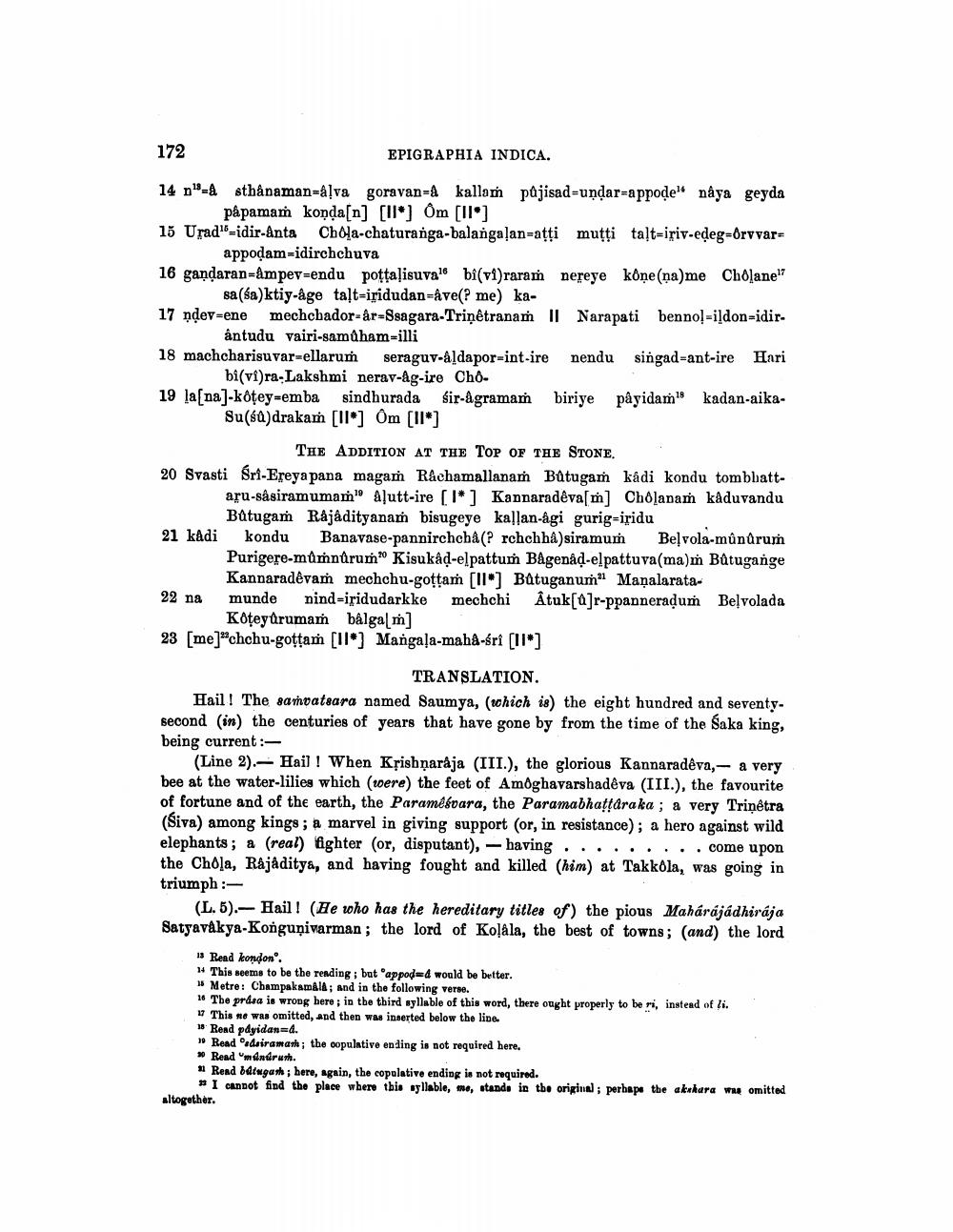________________
172
14 n-Athanaman-álva goravan-A kallamh pajisad-undar-appodenkyn geyda pápamam konda[n] [II] Om [II]
15 Urad"-idir-Anta Choja-chaturanga-balangalan-atti mutti talt-iriv-edeg-orvvar
nereye kone (na)me Chôjane
appoḍam-idirchchuva
16 gandaran-Ampev-endu pottalisuva
bi(vi)raram
sa (sa)ktiy-âge talt-iridudan-âve(? me) ka
17 nder-ene mechchador-Ar-Saagara-Tripêtranam Narapati bennol-ildon-idir. ântudu vairi-samûham=illi
18 machcharisuvar-ellarum seraguv-âldapor-int-ire nendu singad-ant-ire Hari bi(vi)ra-Lakshmi nerav-âg-ire Chô
EPIGRAPHIA INDICA.
19 [na]-kotey-emba sindhurada dir-Agramam biriye payidam kadan-aikaSu(40)drakash [1] Om [11]
THE ADDITION AT THE TOP OF THE STONE.
20 Svasti Sri-Ereya pana magam Râchamallanam Batugam kádi kondu tombhattaru-sâsiramumam Alutt-ire [*] Kannaradêva[m] Cholanam kâduvandu Batugam Rajhdityanath bisugeye kallan-kgi gurig-iridu
kondu Bansvase-pannirchehâ(P rehehhá)siramuth Belvols-mândrum Purigere-madruth" Kisukhd-elpattum Bågenâd-elpattuva(ma) Batugange Kannaradevah mechohu-gottam [11] Batuganum" Manalarata. munde nind-iridudarkke mechchi Atak[0]r-ppannersḍum Belvolada Koteyrumah bálgam]
21 kâdi
22 na
23 [me]"chchu-gottam [11] Mangala-mahâ-éri [11*]
TRANSLATION.
Hail! The samvatsara named Saumya, (which is) the eight hundred and seventysecond (in) the centuries of years that have gone by from the time of the Saka king, being current:
(Line 2). Hail! When Krishnaraja (III.), the glorious Kannaradêva,- a very bee at the water-lilies which (were) the feet of Amoghavarshadêva (III.), the favourite of fortune and of the earth, the Paramésvara, the Paramabhaṭṭaraka; a very Triņêtra (Siva) among kings; a marvel in giving support (or, in resistance); a hero against wild elephants; a (real) fighter (or, disputant), having the Chola, RajAditya, and having fought and killed (him) at Takkôls, was going in triumph:
come upon
(L. 5). Hail! (He who has the hereditary titles of) the pious Mahárájádhirája Satyavakya-Konguņivarman; the lord of Kolâla, the best of towns; (and) the lord
13 Read kondon.
14 This seems to be the reading; but "appod 4 would be better.
15 Metre: Champakamala; and in the following verse.
16 The prása is wrong here; in the third syllable of this word, there ought properly to be ri, instead of li.
17 This ne was omitted, and then was inserted below the line.
18 Read payidan=4.
19 Read dairamam; the copulative ending is not required here.
20 Read "múnúrum.
1 Read bdtugas; here, again, the copulative ending is not required.
"I cannot find the place where this syllable, me, stands in the original; perhaps the akshara was omitted
altogether.




